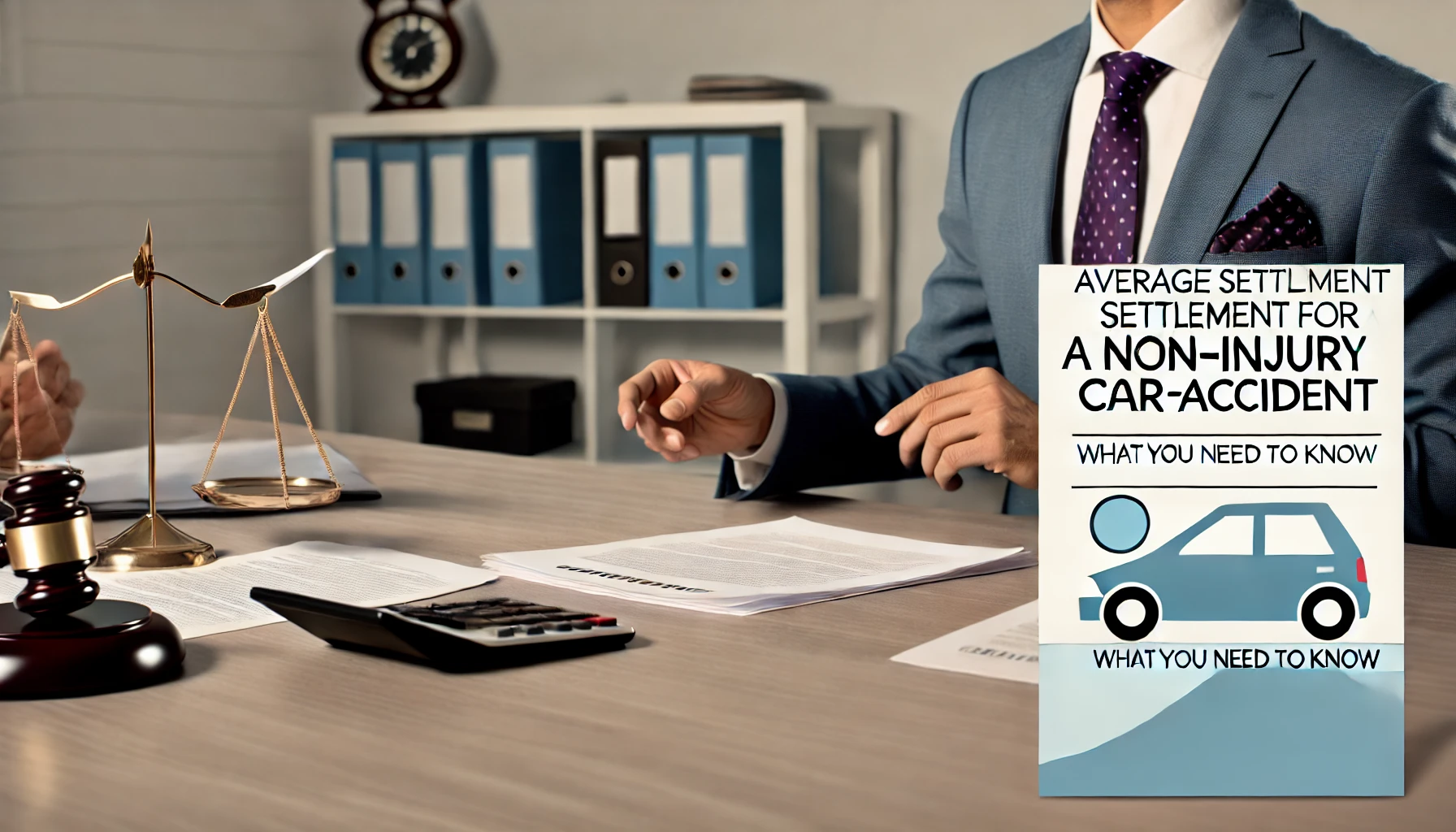Introduction
Non-injury car accidents are accidents where no one gets hurt, but there is still damage to property. In these cases, people seek compensation for property damage, rental costs, and sometimes emotional distress or lost wages. This compensation helps cover the costs related to the accident even if there are no physical injuries.
Understanding Non-Injury Car Accident Settlements
A non-injury car accident settlement covers various types of claims to compensate for the damages and costs related to the accident. Here’s what it typically includes:
-
Vehicle Repairs:
- The main part of the settlement is for vehicle repairs. This covers the costs to fix any damage to your car caused by the accident.
-
Car Rental Fees:
- If your car is being repaired, you may need a rental car. The settlement can include car rental fees to cover this expense while your vehicle is in the shop.
-
Non-Material Damages:
- In some cases, you might also receive compensation for emotional distress. This can cover the stress and inconvenience caused by the accident.
- If the accident caused you to miss work, you could claim lost wages as well. This ensures you are compensated for any income you lost due to the accident.
These settlements are designed to make sure you are not financially burdened by the accident, even if there are no physical injuries.
Factors Influencing Settlement Amounts
Several factors can affect the average settlement amounts in non-injury car accidents. These include:
-
Extent of Property Damage:
- The more severe the damage to your vehicle, the higher the settlement amount. Repairs for significant damage cost more, leading to larger settlements.
-
Loss of Use of the Vehicle:
- If you cannot use your vehicle while it is being repaired, you may receive compensation for car rental fees or other transportation costs.
-
Depreciation of Vehicle Value:
- Sometimes, even after repairs, your vehicle may lose value. Settlements can include compensation for the depreciation of your vehicle’s value due to the accident.
-
Towing and Storage Fees:
- After an accident, your car may need to be towed and stored before repairs. Settlements often cover towing and storage fees.
-
Other Financial Impacts:
- Any other expenses directly related to the accident, such as the cost of replacing personal items damaged in the car, can also influence the settlement amount.
These factors help ensure that the settlement covers all financial impacts from the accident, providing full compensation for your losses.
Average Settlement Ranges
The average settlement ranges for non-injury car accidents can vary widely based on the extent of the damage and associated costs. Here’s a general overview:
-
Minor Damages:
- For accidents resulting in minor damages, such as small dents or scratches, settlements typically range from a few hundred dollars to around $1,000. This amount usually covers basic repairs and minor costs.
-
Moderate Damages:
- Accidents causing moderate damage to the vehicle, like larger dents, broken parts, or minor structural damage, can lead to settlements ranging from $1,000 to $5,000. These settlements cover more extensive repairs and possibly car rental fees.
-
Extensive Damages:
- For more serious vehicle damage, where major repairs or parts replacement are needed, settlements can range from $5,000 to $10,000 or more. This can also include compensation for the depreciation of vehicle value, loss of use, and other related expenses.
-
Additional Costs:
- In some cases, additional costs such as towing and storage fees, or compensation for lost wages and emotional distress, can increase the settlement amount further.
These ranges provide a general idea of what to expect, but the exact amount will depend on the specifics of each accident. Working with a car accident lawyer can help ensure you receive a fair settlement that fully covers your expenses.
Calculating Settlements for Non-Injury Accidents
Settlements for non-injury car accidents are calculated based on several factors to ensure full compensation for all incurred costs. Here’s how these settlements are typically determined:
-
Cost of Vehicle Repairs:
- The primary component of the settlement is the cost of vehicle repairs. This includes labor and parts needed to restore the vehicle to its pre-accident condition. Estimates from auto repair shops are used to determine this amount.
-
Replacement of Personal Items:
- If personal items inside the vehicle were damaged during the accident, the cost to replace these items is included in the settlement. This might cover things like electronics, clothing, or other belongings.
-
Rental Car Costs:
- If you need a rental car while your vehicle is being repaired, the settlement will cover rental car costs. This ensures you have transportation during the repair period.
-
Towing and Storage Fees:
- In cases where your vehicle needs to be towed from the accident scene or stored before repairs, the settlement will include towing and storage fees.
-
Depreciation of Vehicle Value:
- Sometimes, a vehicle may lose value even after repairs. The settlement can include compensation for the depreciation of your vehicle’s value due to the accident.
-
Other Additional Expenses:
- Any other additional expenses incurred due to the accident, such as travel costs or lost wages if you had to take time off work to deal with the aftermath, can also be included.
Example Calculation
- Vehicle Repairs: $3,000
- Personal Items Replacement: $200
- Rental Car Costs: $500
- Towing and Storage Fees: $150
- Depreciation of Vehicle Value: $600
Total Settlement: $4,450
This example shows how different components add up to form the total settlement amount. Each case is unique, so the specific costs and total settlement will vary based on the details of the accident. Consulting with a car accident lawyer can help you accurately calculate and negotiate a fair settlement.
Legal Considerations and the Role of Insurance
In non-injury car accident claims, several legal aspects and the role of insurance companies are crucial in determining the settlement process. Here’s an outline of these factors:
Legal Aspects of Non-Injury Car Accident Claims
-
Liability and Fault:
- Determining who is at fault is a key legal aspect. Fault can impact how much compensation you receive and from whom. Clear evidence such as police reports, witness statements, and photos can help establish liability.
-
State-Specific Laws:
- Each state has specific laws regarding car accident claims. These laws dictate how fault is determined and the deadlines (statutes of limitations) for filing claims. Understanding these laws is essential to ensure your claim is valid.
-
Documentation:
- Proper documentation is legally important. This includes police reports, repair estimates, medical reports (if any), and any other relevant documents that support your claim.
The Role of Insurance Companies
-
Insurance Limits and Policy Coverage:
- Your settlement amount is heavily influenced by the limits and coverage of your insurance policy and the other party’s policy. Each policy has maximum payout limits which cap the amount you can receive.
- Policies may cover different types of damages, such as property damage, rental car costs, and towing fees. Understanding your policy’s coverage is crucial to know what you can claim.
-
Claim Filing and Adjustments:
- After reporting the accident to your insurance company, an adjuster will evaluate the damage and determine the settlement offer. The adjuster’s assessment will include the cost of repairs, rental fees, and other expenses.
- Insurance companies aim to minimize payouts, so initial settlement offers might be lower than expected. Being prepared to negotiate is important.
-
Negotiation and Settlement:
- Negotiating with the insurance company is a critical step. You can present evidence such as repair estimates and additional expenses to argue for a higher settlement.
- If the insurance company disputes the claim or offers an unfair settlement, consulting with a car accident lawyer can help. A lawyer can negotiate on your behalf and ensure that your legal rights are protected.
-
Uninsured/Underinsured Motorist Coverage:
- If the other driver does not have sufficient insurance, your own uninsured/underinsured motorist coverage can help cover the costs. This is particularly important in cases where the at-fault party’s insurance is inadequate.
inadequate.
Why Seek a Settlement?
Pursuing a settlement in non-injury car accidents is important for several reasons, mainly focusing on compensation for property damage and covering other related losses. Here’s why seeking a settlement is beneficial:
-
Compensation for Property Damage:
- Vehicle Repairs: Settlements cover the cost of repairing your vehicle, ensuring it is restored to its pre-accident condition. This includes parts and labor required for the repairs.
- Depreciation: Even after repairs, a vehicle might lose value. A settlement can compensate for the depreciation in your car’s value due to the accident.
-
Covering Additional Expenses:
- Rental Car Costs: If your car is being repaired, you may need a rental car. Settlements can cover the cost of renting a vehicle during this period.
- Towing and Storage Fees: After the accident, you might need to tow your vehicle to a repair shop and pay for storage fees. These costs are typically included in the settlement.
-
Mitigating Financial Impact:
- Lost Wages: If the accident causes you to miss work, you can claim compensation for lost wages. This ensures you are not financially burdened due to time off work.
- Emotional Distress: In some cases, you may receive compensation for the stress and inconvenience caused by the accident.
-
Avoiding Out-of-Pocket Expenses:
- Without a settlement, you may have to cover all the repair and additional costs out of your own pocket. Seeking a settlement helps prevent this financial strain.
-
Legal and Insurance Obligations:
- Settlements help fulfill legal and insurance obligations. Insurance companies are required to compensate policyholders for covered damages, and a settlement formalizes this process.
-
Peace of Mind:
- Knowing that all damages and costs are covered through a settlement provides peace of mind. It allows you to move on from the accident without lingering financial worries.Top of Form
Conclusion
Understanding the nuances of non-injury car accident settlements is crucial for ensuring you receive fair compensation for property damage and other related expenses. Knowing what to expect, how to document the incident, and the role of insurance companies can help you navigate the process more effectively. Consulting with a car accident attorney is highly recommended, as they can provide expert guidance, negotiate on your behalf, and help maximize your settlement.
FAQs
1. How do you respond to a low settlement offer?
Respond to a low settlement offer by carefully reviewing the offer, providing additional evidence to support your claim, and negotiating for a higher amount. It’s often beneficial to consult with a lawyer to ensure you get a fair settlement.
2. What is an example of a car accident settlement in California?
An example of a car accident settlement in California could involve $5,000 for vehicle repairs, $1,000 for rental car costs, and $500 for towing and storage fees, totaling $6,500 for a non-injury accident with moderate vehicle damage.
3. What is the average settlement for a car accident in NY?
The average settlement for a car accident in New York varies widely but can range from $5,000 to $15,000 for non-injury accidents, depending on the extent of property damage and other related costs.
4. What is the average settlement for a car accident in Wisconsin?
In Wisconsin, the average settlement for a non-injury car accident can range from $3,000 to $10,000, again depending on the severity of the vehicle damage and any additional expenses incurred.
Explore the Personal injury realm with The Expert Law. Visit our website for limitless inspiration!





